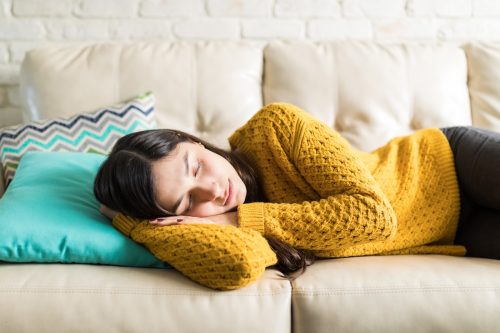5 Things You Are Doing During the Day That Are Keeping You Up at Night

We’ve all been there: tossing and turning, terrified to look at the clock, trying not to calculate how many hours of sleep you could still get if you fall asleep right now. When I’m blindsided with a bout of insomnia, I usually don’t know what’s behind it. I try to practice good sleep hygiene by keeping the room as dark, cool, and quiet as possible (not easy in New York City), putting my phone in another room before bed, and sticking to a simple bedtime routine that signals my body it’s time to rest. Still, sometimes I just can’t sleep. Could something I’m doing during the day be the culprit? After doing some research and talking to sleep experts, it turns out the answer is a resounding yes. Read on to find out about five common daytime habits that can keep you awake at night.
READ THIS NEXT: What Happens If You Take Benadryl Before Bed Every Night, Doctors Say.
1
Eating junk food

Next time you’re struggling to get some solid shuteye, think about what you’ve been eating lately. According to a May 2023 study published in Obesity, research participants who consumed a diet high in sugar, saturated fats, and processed foods for a week had poorer quality sleep than those who followed a healthy diet.
“We looked at slow-wave activity, a measure that can reflect how restorative deep sleep is,” study co-author Jonathan Cedernaes, MD, PhD, said via press release. “Intriguingly, we saw that deep sleep exhibited less slow-wave activity when the participants had eaten junk food, compared with consumption of healthier food. This effect also lasted into a second night, once we had switched the participants to an identical diet.”
So while loading up on sweets, packaged snacks, and fatty foods may not keep you from falling asleep, the rest you get could be less than great quality—and Cedernaes said diet may have an even greater impact on sleep than the study showed.
“Our dietary intervention was … quite short, and both the sugar and fat content could have been higher, he noted. “It is possible that an even unhealthier diet would have had more pronounced effects on sleep.”
2
Sitting all day

If you work a job that requires you to sit for most of the day, you might find it harder to fall asleep at night, says Jade Wu, PhD, DBSM, and Mattress Firm’s Sleep Health Expert.
“We need to be active during the day to earn good quality sleep at night,” she tells Best Life.
“This is for two reasons: 1) We need to be active to save up homeostatic sleep drive, the ‘hunger’ for sleep that accumulates during the day when we’re awake and active; 2) When we’re active during the day, we’re giving our brains a very clear signal that our active hours are day hours, which helps the brain to differentiate between day and night, allowing it to make us more awake during the day and more sleepy at night,” Wu explains.
Since many of us don’t have a choice—some jobs just require us to sit—try to take regular breaks and move your body whenever you can. A daily walk can help!
READ THIS NEXT: 8 Ways to Motivate Yourself to Take a Daily Walk.
3
Not getting sunlight

In summer, I find myself waking up with the sun, right around 5 a.m., no matter what time I turned in the night before. Jill Zwarensteyn, certified sleep science coach and sleep hygiene expert at Sleep Advisor, says this is simply how we’re wired
“Our circadian rhythm works with light exposure. During the day when we are exposed to light, it signals to the brain that it is daytime,” she tells me. “When night falls, the brain knows it’s time for rest, and that’s when increased melatonin production begins in order to promote sleep.”
She says this means that not getting enough light during the day can throw your circadian rhythm off, making it more difficult to fall—and stay—asleep. So if you’re having trouble sleeping at night, make sure to throw those curtains open and let the sun shine in during the day.
“We are day animals, so we need to get lots of light during the day to be energetic when we should be awake, and to be sleepy when we should be sleeping,” adds Wu. She recommends getting at least 30 minutes of time outside in the sunshine every day.
4
Taking naps

This one comes as no surprise to me, an avowed nap-hater since childhood. (They make me cranky and foggy for the rest of the day—plus I always seem to have nightmares when I nap.) Zwarensteyn vindicates me, explaining that taking a too-long nap, or a nap late in the day, can make it hard to fall asleep at night.
“As a general rule, keep naps below 30 minutes and take them before 3 p.m.,” she says. “I also recommend finding a cool, dark, and quiet space to take your nap so you get the most out of it, as these conditions foster better sleep.”
For more health news sent directly to your inbox, sign up for our daily newsletter.
5
Working in your bedroom

With so many of us working remotely these days, it’s pretty common to work out of your bedroom. A 2021 study found that 31 percent of remote workers have set up their office in their bedroom (and 38 percent work from their actual bed!). This isn’t ideal for sleep, however, says Zwarensteyn.
“If at all possible, avoid working in your bedroom so you are able to mentally separate the work environment from your rest environment,” she recommends.
Wu adds that the stress of work can interfere with sleep as well.
“If we’re overstimulated all day long with stressful tasks, multi-tasking, distraction from social media, and everything else, we don’t get the chance to down-regulate,” she says. “That makes it harder to wind down the body and mind for sleep. We should be taking breaks (including from screens) during the day to allow our bodies to calm down and feel safe.”
Best Life offers the most up-to-date information from top experts, new research, and health agencies, but our content is not meant to be a substitute for professional guidance. If you have health questions or concerns, always consult your healthcare provider directly.